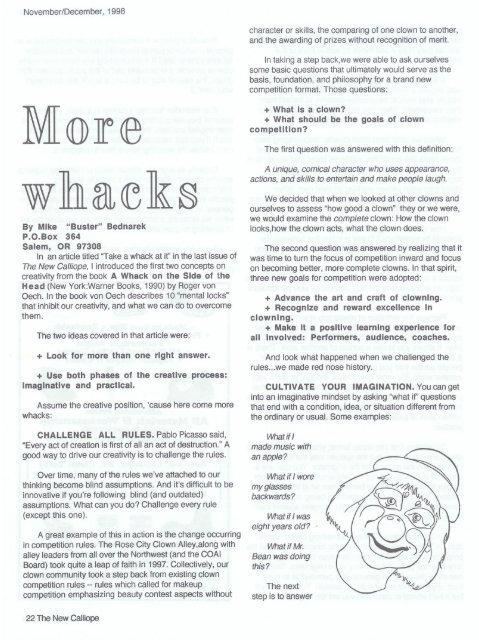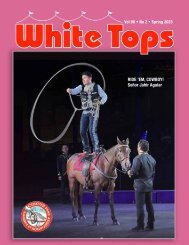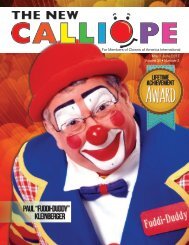Nov_Dec_1998
Create successful ePaper yourself
Turn your PDF publications into a flip-book with our unique Google optimized e-Paper software.
<strong>Nov</strong>ember/<strong>Dec</strong>ember, <strong>1998</strong><br />
character or skills, the comparing of one clown to another,<br />
and the awarding of prizes without recognition of merit.<br />
In taking a step back.we were able to ask ourselves<br />
some basic questions that ultimately would serve as the<br />
basis, foundation, and philosophy for a brand new<br />
competition format. Those questions:<br />
+ What Is a clown?<br />
+ What should be the goals of clown<br />
competition?<br />
The first question was answered with this definition:<br />
A unique, comical character who uses appearance,<br />
actions, and skills to entertain and make people laugh.<br />
By Mike "Buster" Bednarek<br />
P.O.Box 364<br />
Salem, OR 97308<br />
In an article titled "Take a whack at it" in the last issue of<br />
The New Calliope, I introduced the first two concepts on<br />
creativity from the book A Whack on the Side of the<br />
Head (New York:Warner Books, 1990) by Roger von<br />
Oech. In the book von Oech describes 10 "mental locks"<br />
that inhibit our creativity, and what we can do to overcome<br />
them.<br />
The two ideas covered in that article were:<br />
+ Look for more than one right answer.<br />
+ Use both phases of the creative process:<br />
Imaginative and practical.<br />
Assume the creative position, ·cause here come more<br />
whacks :<br />
CHALLENGE ALL RULES. Pablo Picasso said,<br />
"Every act of creation is first of all an act of destruction." A<br />
good way to drive our creativity is to challenge the rules.<br />
Over time, many of the rules we've attached to our<br />
thinking become blind assumptions. And it's difficult to be<br />
innovative if you're following blind (and outdated)<br />
assumptions. What can you do? Challenge every rule<br />
(except this one).<br />
A great example of this in action is the change occurring<br />
in competition rules. The Rose City Clown Alley.along with<br />
alley leaders from all over the Northwest (and the COAi<br />
Board) took quite a leap of faith in 1997. Collectively, our<br />
clown community took a step back from existing clown<br />
competition rules -- rules which called for makeup<br />
competition emphasizing beauty contest aspects without<br />
We decided that when we looked at other clowns and<br />
ourselves to assess "how good a clown" they or we were,<br />
we would examine the complete clown: How the clown<br />
looks .how the clown acts, what the clown does.<br />
The second question was answered by realizing that it<br />
was time to turn the focus of competition inward and focus<br />
on becoming better, more complete clowns. In that spirit,<br />
three new goals tor competition were adopted:<br />
+ Advance the art and craft of clowning.<br />
+ Recognize and reward excellence In<br />
clown Ing.<br />
+ Make It a positive learning experience for<br />
all Involved: Performers, audience, coaches.<br />
And look what happened when we challenged the<br />
rules ... we made red nose history.<br />
CULTIVATE YOUR IMAGINATION. You can get<br />
into an imaginative mindset by asking "what if' questions<br />
that end with a condition, idea, or situation different from<br />
the ordinary or usual. Some examples:<br />
What if I<br />
made music with<br />
an apple?<br />
What if I wore<br />
my glasses<br />
backwards?<br />
What if I was<br />
eight years old?<br />
What if Mr.<br />
Bean was doing<br />
this?<br />
The next<br />
step is to answer<br />
22 The New Calliope







